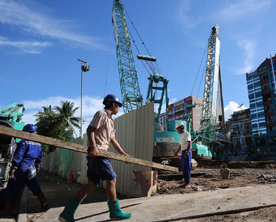When the National League for Democracy (NLD) took office, the construction sector had high hopes that necessary policy changes would be made to boost the real estate market. But after five months of the new government, the real estate market is still sluggish. Despite the fact that the Minister of Construction stated that low-cost housing, costing around 80 lakhs Kyats to buy, would be one of his ministry’s top priority, there has been little information or signs of progress as more people await affordable housing.
Tax Policy is Hurting Developers
“Even compared to last year, the real estate market has been in a decline since April. It is partly because of the tax rate. For example, for transactions between 1 lakh and 300 lakhs Kyats, the tax rate is 15 percent and stamp duty is 5 percent. So total paid is about 20 percent in tax. In my opinion, two things can turn this around for 2017. First, tax law should be submitted to parliament for change. Second, policy needs to be changed. Currently, people are still waiting,” said Sai Khon Noung, the managing director of a real estate agency.
Parliament approved the tax percent for real estate which jumped from 3 percent to 15 percent in January 2015 and has been in effect since April 1. In 2014, parliament only taxed 3 percent on transactions up to 100 million Kyats. But now, those under 30 million Kyats will be taxed at 15 percent, those between 30 million Kyats and 100 million Kyats tax is 20 percent.
Build-Operate-Transfer Hinders Real Estate Market
Build-Operate-Transfer (BOT) system is also one ofthe components that hinders Myanmar real estate. Since 2011, the government introduced the BOT systems, land can be rented from the government for up to 50 years, with two 10-year extensions available. Unlike privately owned land, lands under a BOT contract have to be given back to the government after a maximum of 70 years. However, a lot of buyers do not realize the differences between privately owned land or BOT land. Most of the tender winners build condominiums and sell without notifying the buyers that the land is under a BOT contract. For Myanmar people, property means inheritance which can be passed onto the next generation. So with the fear of losing land to the government, many would-be buyers have become disinterested in making an investment in the real estate sector.
High-rise Inspection Committee has Cost Investors Millions
Another obstacle the real estate sector is facing is the newly formed High-rise Inspection Committee. Thiscommittee reviewed around 200 projects which had already been approved by the former government. The committee however said that all projects in Yangon over nine storeys had to be temporarily stopped. So far, this ruling has cost 12 projects millions of dollars.
One of the 12 developers says, “we lost over $ 10 million each and they did not make public the review criteria. So, we cannot know whether we meet the criteria or not. Moreover, they should check according to former government’s policies not with new ones and new policies are lack of transparency.” He added that, “When new government came into power, we expected the real estatesector to get back on track. But it is still the same.”
Room for Improvement
Additionally, according to Myanmar Investment law drafts which have not passed yet, there will be no automatic tax-exemption for both local and foreign investors. For existing law, there is a five year tax-exempt incentive aimed to garner the foreign investors. The draft bill gives another exemption based on location. It split the country into zones in order to incentivize development in more rural parts. Zone 1 and 2 are the least to moderately developed regions and will get more of a tax break than developers working in Zone 3 which includes developed regions like Yangon.
Nitesh Khirwal, Co-founder & Managing Director of House.com.mm says “The new government has adeep interest in the Real Estate sector, as seen in the focus on organized development of the sector and affordable housing projects. Post YCDC review process, policy clarity within the sector will result in a positive sentiment, both for property developers and property buyers. The government is also actively exploring ways to improve availability of finance for developers and buyers, which should aid the sectors significantly. Based on all these positive externalities, we expect that there should be an uptick in housing activity in 2017.”
Moe Moe Aung, secretary of the Myanmar Real Estate Association says “the main reason to improve the real estate is law must be enforceable as well as transparent.”










